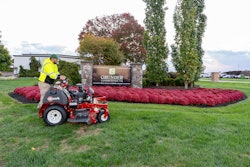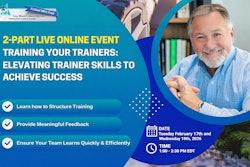When it comes to landscaping and gardening, there seems to be a gap between those who can and those who can’t. Traditionally, landscape companies have a greater market with those who can’t because those who can – do. Learning to cater to the group in between can help expand a landscape company’s market.
Garden coaching may be the answer to closing that gap. Over the past year, it has been featured in several media outlets as well as publicized through garden coaches’ blogs on the Internet. There is even an online directory of coaches at www.thegardeningcoach.com.
Susan Harris, a coach in Takoma Park, Maryland, says that coaching involves teaching people to be independent.
“Most [of my clients] are people who want to take care of what they have,” she says. Others are experienced gardeners who want another set of eyes to help broaden their understanding of the craft.”
Garden coaches may specialize in areas from landscape design to botany. Some are master gardeners, and others simply turned a love of the hobby into a profession. By working hands-on with clients, garden coaches are able to explain what is happening in the garden in a way the client understands.
Jason Domanico of Seattle, Washington, sought out a garden coach because he wanted to learn the proper way to care for his garden. He says that while books may have pictures and instructions, they pale in comparison to having a live instructor.
Robin Haglund, a garden coach and president of Garden Mentors in Seattle, teaches clients how to communicate with landscapers.
“I equate garden coaching to taking a class in auto mechanics just so you know what the mechanic is telling you,” she says.
Haglund often refers clients to other professionals, from certified arborists to construction companies. She sends clients on field trips to places like rock yards to look at materials.
Clients also enjoy the cheaper rates of garden coaching, with fees ranging from $25 to $150 a visit.
While garden coaching may not provide the same revenue, it can help landscape companies expand their client base and lead to improved profits on down the line.
~Jennifer Mitchell
Letter to the editor
Dear Editor:
I first want to generally commend your publication for its tear-out “Safety Watch” feature, and specifically for the February 2008 feature titled, “Avoiding Electrical Shock,” authored by Olivia Grider. However, I must take exception to some of the advice given.
This particular article discusses landscape companies taking on tree work without the requisite experience, the first of several great points it raises. When one moves from landscape installation and maintenance into genuine tree work, one enters a whole new realm of risk.
Secondly, the points made in the article about the hazards of electricity should be taken to heart by everyone in the green industry. Electricity is one of the principal killers of workers in tree care and landscaping, and it is present in one form or another on almost every worksite.
I take exception to the article’s admonition to employees to use rubber boots and gloves if they are going to work in the vicinity of overhead lines. I’m going to presume that the article implies lineman’s gloves and overshoes, and not perhaps a lawn applicator’s rubber boots and nitrile gloves?
In any case, the advice is in direct conflict with the ANSI Z133 Standard for Arboricultural Operations – Safety Requirements, which states that even linemen’s overshoes or rubber gloves shall not be considered to provide any measure of safety from electrical hazards. It is also in direct contravention to OSHA standards and interpretation, which I would summarize this way: If you’re going to rely on a qualified person’s tools and techniques to avoid injury, you need to be that qualified person. The typical line clearance tree trimmer doesn’t meet the qualifications that OSHA requires, and with all due respect I doubt that your readers would meet them either.
When there is a downed electrical conductor in the voltage range discussed in your article (69,000 volts or 69kV), then the potential for electric shock comes from three sources: direct contact, indirect contact through a conductive object such as a tree limb or chain-link fence, or step potential; i.e., when the ground itself is energized.
The general admonition to workers should be this: Learn about electricity and the various ways it can kill you. When an accident occurs, get clear and stay clear. Summon authorities and in most cases, don’t try to be a hero. In the case of high voltage, most rescue attempts by untrained personnel end up producing a second victim.
Peter Gerstenberger
Senior Advisor for Safety, Compliance and Standards Tree Care Industry Association
Manchester, New Hampshire
OSHA: Employers must pay for safety equipment
OSHA now requires employers to pay for employees’ job-related personal protective equipment. The rule, which took effect on February 13, must be implemented by May 15.
With the exception of a few items – such as steel-toe boots (considered to be non-specialty-specific protective footwear) and prescription safety eyewear – employers must pay for the minimum level of necessary PPE, including hard hats, chemical protective equipment, fall protection equipment, gloves, goggles, safety shoes, safety glasses, face shields, welding helmets, etc.
Employers can either pay outright for the equipment, give employees an allowance to purchase it themselves or reimburse them for purchases made on their own.
If an employer requires upgraded PPE, it must pay the cost. On the other hand, if the upgrade is the employee’s choice, then the employee pays for it. Employers do not, however, have to provide PPE not listed in previous OSHA standards.
OSHA believes the rule will lead to 21,000 fewer occupational injuries per year.
Employers do not need to document their compliance. “Unless there is some issue where an employee says they paid for PPE and the employer argues otherwise, documentation isn’t necessary,” says Patrick Kapust, safety and health specialist, OSHA. “A prudent employer, however, would keep adequate documentation.”
Employers can receive a citation and/or a penalty fee if an OSHA inspector finds non-compliance while performing a routine inspection, Kapust says, or if an employee fills out a legitimate complaint form concerning a lack of paid-for PPE.
~ Barbara Ibrahim Cox
CLIPPINGS
ANLA, PLANET support H-2B petition
The American Nursery and Landscape Association and the Professional Landcare Network have asked members of Congress to sign a discharge petition filed by Rep. Charles Boustany. The petition is titled the “Save Our Small and Seasonal Businesses Act of 2007.”
International Pool/Spa/Patio Expo moves to Las Vegas
The 2008 International Pool/Spa/Patio Expo will be held at the Mandalay Bay Convention Center on the south end of the Las Vegas strip. Convention dates are November 18-20, and special education programs will begin on November 15.
LebanonTurf sponsoring Project EverGreen
Project EverGreen, a national nonprofit organization aimed at raising awareness of environmental, economic and lifestyle benefits of landscapes, recently added a new sponsor, LebanonTurf.
2007 record year for JCB
In 2007, JCB sold over 72,000 machines – an increase of 30 percent – bringing the company’s revenue during 2007 to $4.5 billion compared with $3.5 billion in 2006. Its share of the world construction equipment market rose from 10.4 percent in 2006 to 12 percent in 2007. In addition, India became JCB’s single largest market with sales of over 17,000 machines.
Husqvarna acquires outdoor products operation
Husqvarna acquires Jenn Feng, a Taiwanese company that produces chainsaws, trimmers and other equipment for the consumer market. This acquisition not only gives Husqvarna more presence in Asian markets but also allows them access to the McCulloch brand in the North American market. It already owns rights to this brand in the rest of the world.
Emak USA signs new distributor
Emak USA signed R.D. Faulkner Corporation as the newest distributor of Efco power equipment. R.D. Faulkner is located in Brewer, Maine, and will distribute Efco equipment to Emak’s New England territory.
PLANET names new president
The Professional Landscape Network (PLANET) named Jason Cupp, CLP, as its new president. Cupp previously served as the president-elect beginning in November 2006. He is the CEO of Highland Outdoor in Olathe, Kansas.
Yanmar opens new production facility
Yanmar recently opened a new 240,000-square-foot production facility in Adairsville, Georgia. The plant will produce Cub Cadet tractors in accordance with Yanmar’s joint venture with Cub Cadet. The expansion is expected to provide up to 200 new jobs for the area.





